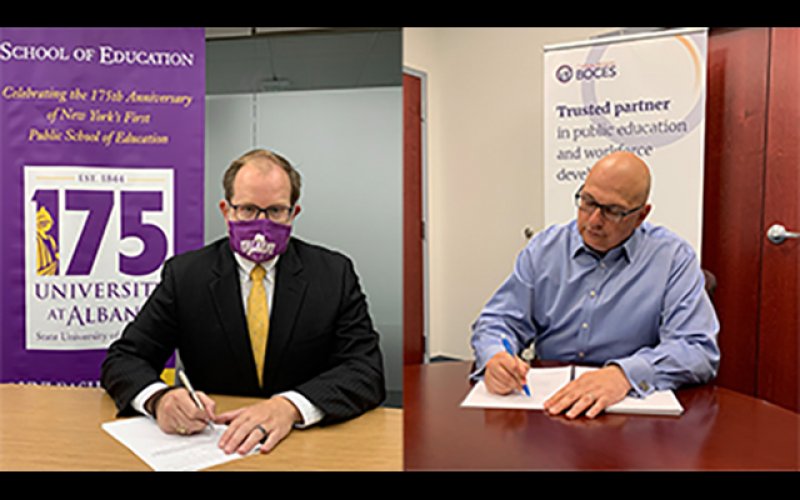BOCES and School of Education Team to Provide More Diverse and Better-Trained Teacher Assistants for Area Schools

School of Education Dean Jason Lane, at left, and Capital Region BOCES Senior Executive Officer Joseph Dragone sign the agreement creating the Academy for the Advancement of Teaching Assistants.
Albany, N.Y. (Oct. 6, 2020) — Current K-12 teacher aids and teaching assistants have a new avenue to advance their careers, thanks to a partnership announced last week between the Capital Region Board of Cooperative Educational Services (BOCES) and UAlbany’s School of Education.
The program, the Academy for the Advancement of Teaching Assistants (AATA), will be funded through a $197,606 New York State Workforce Development Initiative (WDI) grant and is intended enhance the preparation of teaching assistants across the region. ,.
Located at UAlbany, the part-time, one-year cohort-based program will address a regional shortage of teaching assistants in public and private schools as well as address a corresponding shortage of diversity of educators in classrooms across the region. It will also help create a pipeline for teachers, as many teaching assistants encouraged by their success in the program will seek to become certified teachers.
In addition to supporting the aspirations of currently employed TAs, said Jerry Rivera Wilson, SOE’s director of professional development and continuing education and of AATA, “the program is also ideal for individuals looking to return to the workforce or interested in a career change from corporate to the classroom.”
UAlbany’s AATA program looks to have at cohort of 29 students in its first year. WDI foresees that their advancement will not only bolster area schools, but help the regional economy recover from the impact of COVID-19.
“AATA provides a unique opportunity for adults to earn the educational and professional credentials required for teacher assistant certification through a variety of resources and supports, and is delivered in a flexible format that combines online learning, seminars and mentoring,” said Rivera-Wilson. She noted that AATA funding covers participants’ tuition, exam fees and even bus passes for those “under-employed” or unemployed.
“We’re excited to be able to expand and diversify the Capital Region’s educational workforce, which is needed more than ever, by providing new career pathways and job readiness skills through AATA,” Jason Lane, dean of SOE. “We look forward to working with our partners at Capital Region BOCES to upskill and reskill members of our community for jobs directly supporting students throughout the region.”
New York’s Department of Education recognizes three levels of teaching assistant certificates, with higher level certificates leading to higher paying jobs. Currently, local districts are seeing shortages in all levels. AATA will start by training adults to earn Level I or II certificates and, in the future; also include Level III certification.




